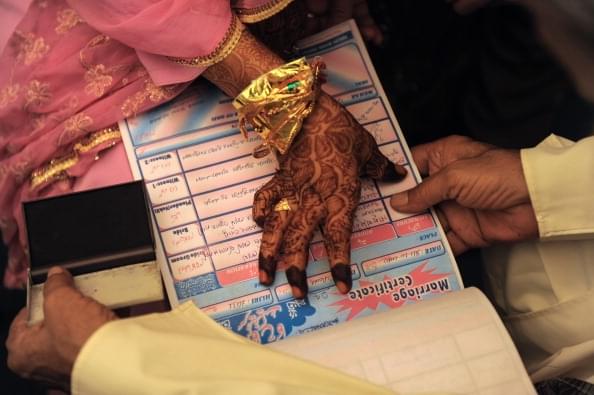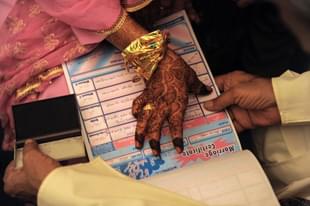Ideas
SC’s 3-2 Triple Talaq Verdict Deserves Two-And-A-Half Cheers, Not Three
R Jagannathan
Aug 22, 2017, 02:08 PM | Updated 02:08 PM IST
Save & read from anywhere!
Bookmark stories for easy access on any device or the Swarajya app.


The cause of justice is never straightforward or smooth. That it took more than 30 years after the Shah Bano judgement for the Supreme Court of India to junk another monument to gender injustice – the triple talaq – with the full-throated backing of a “communal” party like the Bharatiya Janata Party (BJP) is one part of the irony. That it took a narrow 3-2 majority verdict from a multi-faith bench, where only one of the judges was from the majority community, to declare triple talaq unconstitutional is an even more delicious irony. More so since the reasoning through which the majority verdict was arrived at is partly faulty.
In the 3-2 verdict that declared triple talaq unconstitutional today (22 August), two of the concurring judges – U U Lalit and R F Nariman – struck it down for the right reasons: that it was violative of article 14, which guarantees equality of treatment before the law. The right of a Muslim man to divorce his wife merely by uttering “talaq” three times is clearly loaded against women.
But the third judge who rendered triple talaq unconstitutional, Justice Kurian Joseph, came to the right conclusion by the wrong route: he saw it as unconstitutional because it goes against sharia and the basic tenets of the Quran.
This kind of judgement is dangerous, for it wrongly places holy books above the Constitution. If upholding the Constitution needs a reference to holy books, it follows that the law is about interpreting different religious laws so as to align them with the Constitution rather than upholding the Constitution itself.
Justice Joseph held that triple talaq is not an integral part of Islam, and is against the basic tenets of the Quran and violates the sharia. Since triple talaq is bad in sharia law, it is therefore bad in Indian law too.
Let’s assume for a moment that he is right. But when different people can hold different parts of a practice as essential to religion, does it make any sense for a judge under the Indian Constitution to look into religious law to arrive at a decision?
In fact, the dissenting judgement, delivered by Chief Justice of India (CJI) J S Khehar and Justice Abdul Nazeer, had the exact opposite view. Contrary to what Justice Joseph held, they were emphatic that triple talaq is integral to Islam in India and a part of Muslim personal law. They also held that it is not violative of articles 14, 15, and 21. Article 15 talks of non-discrimination on grounds of religion, and article 21 is about protecting life and liberty where no one is denied the due process of law.
This dissenting judgement thus calls for Parliament to make a law on this subject, and bans Muslims from practising triple talaq for six months, till a new law is framed in this regard.
But going by the logic of the judgement, CJI Khehar and Justice Nazeer would essentially want a law that upholds or regulates triple talaq in some form, since they believe it is an essential part of Indian Islam. In short, they want a Shah Bano kind of legislative reversal of a Muslim woman’s fundamental rights.
However, given the 3-2 verdict, and also given the Narendra Modi government’s resolute backing for ending triple talaq, no such law to validate triple talaq in any form will be forthcoming.
The majority verdict is thus the law of the land, and will remain so even if Parliament makes no law in this regard in six months’ time.
The Modi government should, however, do the right thing and bring forward a law to ban triple talaq, even if the “secular” parties oppose it or prevent its passage. At the very least we will know who really stands on the side of gender justice.
What the Modi government cannot do is a Rajiv Gandhi, where the Supreme Court verdict is overturned in order to woo the Muslim vote.
The triple talaq vote was won by a whisker, and hence deserves only two-and-a-half cheers, and not three, despite three votes in its favour.
Jagannathan is former Editorial Director, Swarajya. He tweets at @TheJaggi.





